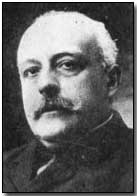Who's Who - Antonio Salandra
 Antonio Salandra (1853-1931) served as
Italy's Prime Minister from the outbreak of war in Europe until his
resignation two years later following military defeat at the
Trentino in May
1916.
Antonio Salandra (1853-1931) served as
Italy's Prime Minister from the outbreak of war in Europe until his
resignation two years later following military defeat at the
Trentino in May
1916.
Born in Troia, Puglia to a wealthy family on 13 August 1853, Salandra was educated in law and was professor of administrative science at the University of Rome before deciding to enter politics.
An authoritarian conservative, Salandra's political career saw steady progress. He was appointed Minister for Agriculture in 1899 and Finance Minister seven years later (and again in 1909-10).
Taking office as Prime Minister in March 1914 in the wake of a political crisis and with shortages caused by the Turkish war of 1911-12 commonplace, Salandra was seen by many as merely a stop-gap premier. Indeed it is probable that his administration would have fallen by mid-summer had not the July Crisis intervened, halting the riots that had broken out in June.
Salandra publicly announced Italy's policy of neutrality on 2 August, reflecting popular opinion across the nation. This was despite Italy's membership of the Central Powers alliance with Germany and Austria-Hungary.
However Italy (which had earlier negotiated a secret treaty with France in any event) escaped its obligations by citing Austria-Hungary's decision to attack Serbia without first notifying Italy as providing legitimate cause for the latter's policy of neutrality.
Salandra, who was determined to pursue a policy of Italian self-interest, was eventually persuaded that Italy's future was best served by entering the war on the side of the Allies. His hand was strengthened when he came away from the secret 1915 Treaty of London with commitments from the Allies to support Italian territorial ambitions after the war (chiefly at the expense of Austria-Hungary).
Finally entering the fray on 23 May 1915 on a wave of popular support, Salandra hoped for a relatively short war with the prospect of sweeping Italian territorial gains. He was to be disappointed in both.
With military policy firmly dictated by Chief of Staff Luigi Cadorna - who repeatedly resisted Salandra's ineffectual attempts to assert political control of the military campaign - Italy failed to make any significant gains despite innumerable attempts along the Isonzo (eleven battles in all).
At last, with defeat at the Trentino in May 1916, Salandra's government fell on 10 June 1916, the first to do so among the Allies. Salandra played no further wartime role in either the Boselli or Orlando administrations, although he served as a delegate at the Paris Peace Conference and subsequently represented Italy at the League of Nations.
After the war Salandra's brand of conservatism led him to initially support Benito Mussolini and his fascist policies, although he later modified his position. He was made a senator by Mussolini in 1928.
Antonio Salandra died in Rome on 9 December 1931 at the age of 78.
'Case-Shot' was the name for a short-range artillery anti-personnel shell filled with pellets, chain-links, etc.
- Did you know?
